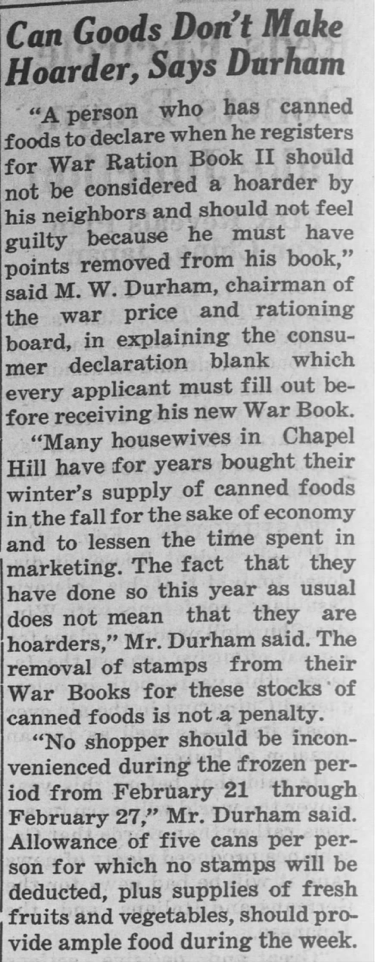
A Newspaper article claiming that those storing canned food will be taken their points off from their ration book and thus are not regarded as a hoarder. “Can Goods Don’t Make Hoarder, Says Durham.” The Daily Tar Heel, February 13, 1943, Accessible Archives.
This artifact is a newspaper article from The Daily Tar Heel which was published in 13th February 1943 in Chapel Hill, North Carolina. The article reports a statement issued by M.W. Durham, chairman of the war price and rationing board, explaining the consumer declaration blank which every applicant must fill in when receiving the war ration book. In the statement, he says that those who are storing canned goods beforehand will not be considered as hoarder since the ration book’s system will take off point for these stocks of canned food.
The article reveals that it was common for a housewife in Chapel Hill to buy winter supply during the fall season due to economic reason and also to spare time spent on marketing. This suggests that canned food was essential for the foodways in Chapel Hill, especially during the winter season. Also, the article shows the sentiment people had against hoarding, since M.W. Durham is saying that those who have already bought and stored canned food ‘should not be considered a hoarder by his neighbors and should not feel guilty.’ I found this interesting because buying and storing canned food was habitual practice in Chapel Hill that some people are still following like this article mentions, however, at the same time, there was antipathy towards this practice. In that sense, I think this article is suggesting a transition of people’s idea towards food storage from something normal or wise to do to something that is to be criticized during the wartime too.
In Chapel Hill, there were about 8000 people who meet the requirement of receiving the war ration book including many UNC students [1]. Therefore, in the newspaper, there were many articles on the usage of war ration book among the students stating that there will be a penalty of heavy fine or possible imprisonment for mailing ration book back home or sending the products bought by the ration book back home. As long as students stayed on campus they didn’t necessarily need ration book on their daily basis. However, receiving ration book was recommended to all students and therefore registration was held at Chapel Hill elementary school which is close to the UNC.
Karin Tsubakihara
Footnotes
[1]”Sugar Ration Continues.” The Daily Tar Heel (Chapel Hill, North Carolina), May 5, 1942.